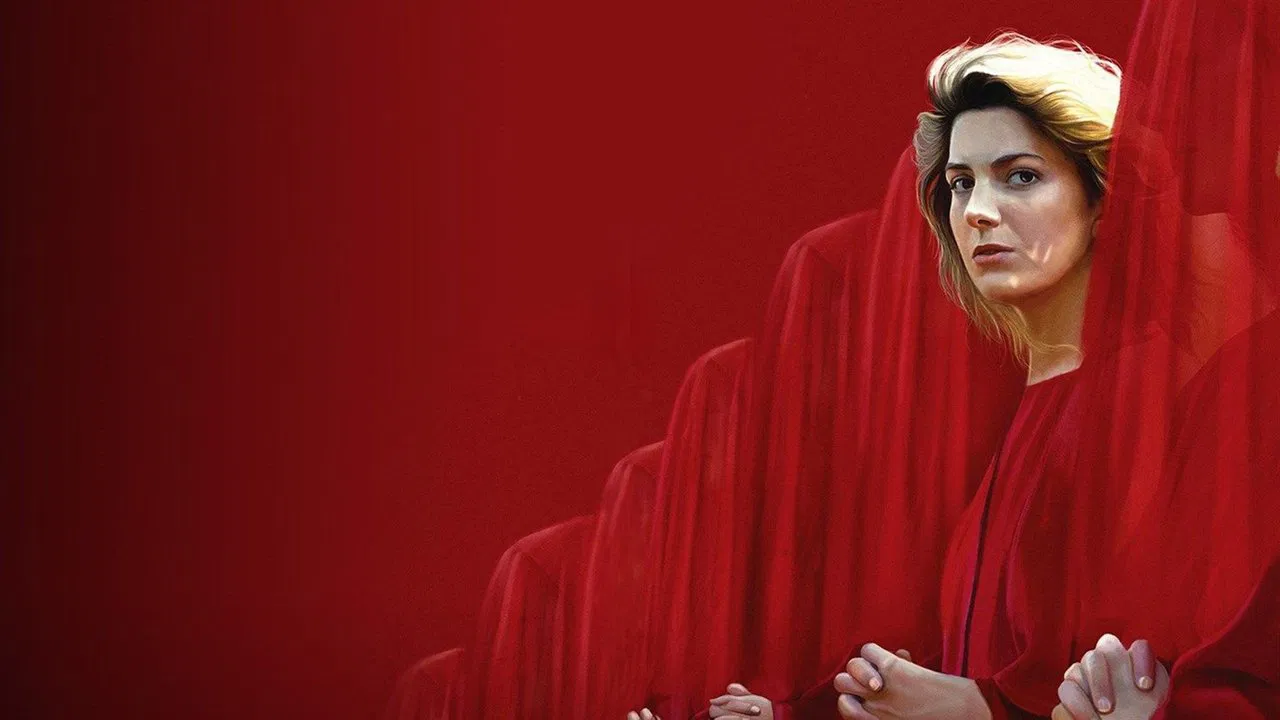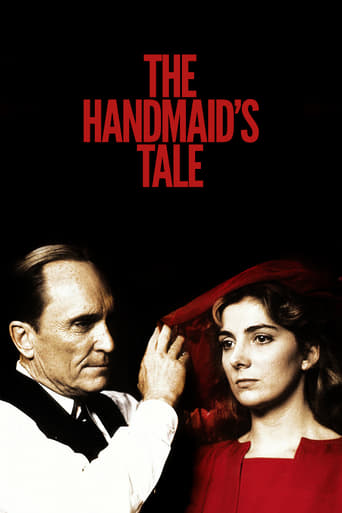Bessie Smyth
Great story, amazing characters, superb action, enthralling cinematography. Yes, this is something I am glad I spent money on.
ehobba
Boring as heck with the worst possible acting. Like acting so terrible and emotionless, it makes Kristen Stewart in Twilight look like she could play the Joker. The book, which I had to analyse at school, was tedious, disturbing in its descriptions, and had a horrible ending - but I would honest to god think that watching paint dry would interest me more than this plot less trash that has (no joke) ten-minute sex scenes that we thankfully skipped past. It is even less about feminism than the book and fails to explain how their society came to be the way it is (not that the book really did that either). Don't put yourselves through the torture - if I could've given it a negative star rating, I would have.
Misty Rae McAnally
First and foremost, the movie makes it very clear that it is "based" on the novel. Differences, therefore are to be expected.For the most part, the movie follows the book fairly well, with a few differences. One of the things I liked in the book was her utter anonymity. It could very well have been myself that I was reading about as we're not given her name. It's hinted in the first chapter that her name may be June but it is never fully laid out. This made the book hit a bit closer to home for me than the movie did.The costumes are not very accurate portrayals of what's in the book. It means that the visuals and symbolism are a bit...off, but it isn't that big of a problem.All in all, I found the movie to be VERY watchable. I probably wouldn't enjoyed it so much if I hadn't just finished reading the novel yesterday so I can assure you that it is best to have the book fresh in your mind when you watch the film so you can be aware of the differences as they appear.I would strongly suggest this movie as a cautionary tale, especially in the current political climate of the US. The Republic of Gilead does not seem as safely distanced from the realm of possibility as I would truly like it to be.
rakabak
The story is from the book and is what it is - I happen to like it very much. Some seem to think the story is ridiculous, over the top, irrelevant - I happen to disagree but I still say the movie is a serious disappointment as a film.With the exception of the cast, which of course a book doesn't have, everything that's great about the movie is derived from the book, and everything that's terrible about the movie is the film's own. Some have commented on the vibrant colors of the womens' caste clothing - red, blue, white - the veils, the crowd scenes - these are Atwood's creation, clearly described and strongly symbolic throughout the novel. Actually, the cinematography doesn't make any specific use of these elements at all - the elements just exist as described in the book, and the meaning is actually reduced in the film as compared to the book. For example, whereas the book repeats motifs such as the bodies swaying over the archway, and makes them meaningful, the camera glances over these elements once only and reduces them to a vague element that's basically been checked off the list of items to be adhered to. Another example is the Salvaging scene - the book makes it clear that the venue is re-purposed from a cultural facility, a place with meaning to Offred. The scene is massive, the emotion is throbbing, the pressure is overwhelming. The film reduces this scene to a cheap little temporary grandstand next to a forgotten courtyard and about thirty individualized handmaids - not the herd of emotional, blindly following women described so effectively by Atwood.That Salvaging scene is also an example of how the film defuses at every turn any potential for character development and emotional tension. In the book, Offred doesn't know Ofglen, doesn't trust the situation even when she begins to think that Ofglen might be making overtures, always feels afraid of giving away her inner state before this other red-veiled woman - until the Salvaging scene. When the man is beaten by the women, Ofglen leaps into the fray and knocks the man unconscious. Offred is shocked and taken aback, until Ofglen explains extremely quietly (not overtly as in the film) that he was a political. The book makes it clear that women have been turned against one another by this regime, anyone could be a secret agent or a true believer, everyone is isolated from each other. The film on the other hand shows Offred making allies everywhere she goes, and this simply isn't true to the book's premise. The Martha (the caste name for female servants) isn't particularly friendly, Nick is an ambiguous figure, Serena Joy is rather crazier and more unpredictable than her role on screen.Those are just a few examples of the degradation of the story in this film adaptation. If you haven't yet read the book, the story in the film might still be strong enough to watch, and I think it's a useful and interesting story overall, so I wouldn't advise against watching the film - but be warned, the cinematography and set design is just about as boring as it could possibly be. Camera angles - nonexistent. Depth of field - rotten. Mood - tolerable but less dynamic and compelling than it could have been, by a wide margin. The story arc and the editing were also extremely bland, and the sad thing here is, if the direction had simply adhered to Atwood's style, which used flashbacks at Offred's times of emotional stress to develop the back story, the film could have been a ground-breaker. If Offred hadn't been tarted up with her open jacket and her exposed hair, the contrast between her mandated outward state and her conflicted inner states could have come through more strongly. If the house and her room had as forbidding as in the novel - her actions and resources curtailed in order to prevent another suicide and to keep her under control - the film might have captured some of the book's power.There were even allusions made in the screenplay that started to follow the novel's depth but then weren't followed up on, such as the novel's reference to the prior Handmaiden's suicide and Offred's subsequent inspection of her room for avenues of self-destruction, or the tentative overtures Ofglen made to Offred by using the words "May Day", and how this overture might have backfired on Offred when she attempted to use it later with the new Ofglen. What a disappointment the film was in this respect.Taken all in all, the film just began to seem lazy.And yet, the novel is a solid work of literature and it can't be easy to turn a work of internal drama into a visual form while retaining subtlety and staying faithful to the entire plot. Even so, the film wasted a lot of time on plot elements that didn't even exist in the book. Spending so many frames on the border scene, with multiple flashbacks to her child's wanderings, when these weren't even part of the original story and many other flashbacks didn't make it in - this seems like a serious error to me. The actors were very good. I can't fault any of them. They were all entirely believable. The adaptation just wasn't as rich as the novel, nor as rich as many movies manage to be.If for example a friend wanted to see the movie, I would watch it again. It's not terribly torturous, it's just rather tedious and it does the novel a disservice. It doesn't make use of the unique power of the camera to tell a story. While the story will remain a classic, the film adds nothing to it.
SatyrIX
thoroughly abject, plain Jane production design and vanilla mush of a story. The premise of this lunatic, virginity-obsessed oligarchy that America has somehow become is merely unexplored window-dressing to a soporific and pedestrian story arc. All in all this film stands as an anti-adaptation of the source material. Hard to believe Volker Schlondorff was a participant in turning this one out. Aside from consideration of this doleful picture it is rather amusing to notice that to a comment every positive review of this film is a transparent excuse for righteous soapboxing against misogynism in society rather than the film per se.

